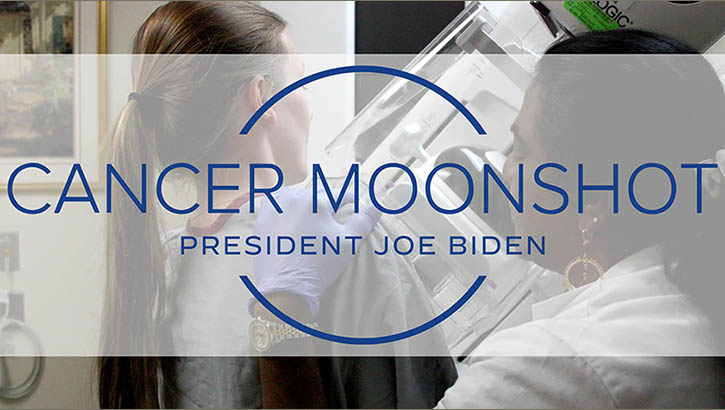On Feb. 2, 2024, President Biden celebrated the two-year anniversary of the reignited 2016 White House Cancer Moonshot initiative, an effort across multiple federal agencies aimed to reduce the death rate from cancer by at least 50 percent over the next 25 years. Cancer Moonshot is also focused on improving the experience of people and their families living with and surviving cancer, with a goal to ultimately end cancer. To that end, the military medical community has made great strides and advancements.
Uniformed Services University’s Murtha Cancer Center Research Program in Bethesda, Maryland leads the DOD’s component of Cancer Moonshot’s efforts. Among many groundbreaking research projects, the Program has achieved national acclaim for its role in ovarian cancer research, development of targeted therapies for breast cancer that doesn’t respond to treatment, as well as lung and skin cancer research.
In response to Cancer Moonshot, the DOD, the Department of Veterans Affairs, and the National Cancer Institute created the Applied Proteogenomics Organizational Learning and Outcomes Network. As a trial network, APOLLO was part of a White House "reignition" Fact Sheet: President Biden Reignites Cancer Moonshot to End Cancer as We Know It. APOLLO originally included 13 DOD and VA hospitals that launched eight cancer-specific programs, including studies in lung, breast, prostate, ovarian, pancreatic, testicular, and brain cancers. Today, APOLLO is comprised of 15 DOD and VA hospitals and has expanded to studies of all cancer types.

At its initial launch in 2016, Cancer Moonshot set forth three ambitious goals:
- Accelerate scientific discovery in cancer
- Foster greater collaboration
- Improve the sharing of data
Cancer Moonshot has united a large community of investigators and clinicians who are dedicated to expediting research to improve the lives of people with cancer and their loved ones.
Related Websites
You also may be interested in...
Article
Dec 27, 2022
Women’s heath equity is fully invested in by DOD’s actions, acting AD for Health Affairs tells a recent podcast.
Article Around MHS
Dec 22, 2022
Providing safe, excellent, quality care to patients takes incredible work and dedication - especially when it comes to women's health. Find out what's happening at Blanchfield Army Community Hospital that landed them a top spot on the Best Hospitals for Maternity Care list.
Article
Dec 15, 2022
Breast health and annual mammogram screenings should be your top priorities to protect against cancers and are easier than ever to schedule wherever you are.
Article
Dec 7, 2022
Dementia and its most common form, Alzheimer’s disease, are cognitive disorders that affect more women than men. Although there are various theories on why, more equitable research is needed.
Article
Dec 1, 2022
The Military Health System offers ample contraceptive care services to help beneficiaries take control of their health, life, and careers.
Video
Nov 23, 2022
Walk-in contraceptive services are now available at military hospitals and clinics. No referral or appointment is required. Check with your local military hospital or clinic to see if walk-in appointments are available. Learn more at health.mil/womenshealth.
Article
Nov 22, 2022
Though the overall death rate from colorectal cancers have been on the decline in recent years, it remains the second leading cause of cancer deaths in the United States.
Article Around MHS
Nov 20, 2022
Bayne-Jones Army Community Hospital encourages soldiers and civilians at the Joint Readiness Training Center and Fort Polk, Louisiana to grow a mustache this November to raise awareness about prostate and testicular cancers, mental health, and suicide prevention for men.
Article Around MHS
Nov 14, 2022
In April 2022, the U.S. Air Force issued a clarification of policies pertaining to aircrew during pregnancy. The policy recognized the need to provide aircrew, commanders, and health care professionals greater awareness of and transparency around the process for submission and review of waivers to fly during pregnancy.
Video
Nov 9, 2022
This MHS Minute focuses on the contraceptive care services available to service members and beneficiaries. Learn more by visiting: https://tricare.mil/birthcontrol and https://www.health.mil/Military-Health-Topics/Total-Force-Fitness/Preventive-Health/Womens-Health/Contraceptive-Care-QnA
Access communications products at https://www.health.mil ...
Article Around MHS
Nov 7, 2022
The John P. Murtha Cancer Center at Walter Reed National Military Medical Center hosted its 2022 Breast Cancer Summit virtually Oct. 26. The summit is held annually during Breast Cancer Awareness Month in October.
Article Around MHS
Nov 2, 2022
One in eight women will face cancer in their life. Additionally, breast cancer has a 99 percent survival rate if detected in early stages and a 29 percent survival rate if detected late. U.S. Navy Lt. Cmdr. Samuel Douglas, Ford’s surgeon, offers a service in identifying breast cancer in the early stage for women aboard Ford. Douglas’ service is just ...
Article
Nov 1, 2022
Walk-in contraceptives services help service members with convenience of one-day, no appointment care, and help the military with readiness.
Fact Sheet
Nov 1, 2022
 .PDF |
113.53 KB
.PDF |
113.53 KB
Frequently Asked Questions about reproductive health care. TRICARE has coverage for both medical and pharmacy benefits and includes a list of covered and non-covered services.
Publication
Nov 1, 2022
 .PDF |
253.41 KB
.PDF |
253.41 KB
This case definition was developed in 2010 by the Armed Forces Health Surveillance Center (AFHSC) in collaboration with a working group of subject matter experts from the Office of the Assistant Secretary of Defense for Health Affairs (ASDHA), the United States Army Public Health Command (USAPHC) and the United States Military Cancer Institute. The ...
You are leaving Health.mil
The appearance of hyperlinks does not constitute endorsement by the Department of Defense of non-U.S. Government sites or the information, products, or services contained therein. Although the Defense Health Agency may or may not use these sites as additional distribution channels for Department of Defense information, it does not exercise editorial control over all of the information that you may find at these locations. Such links are provided consistent with the stated purpose of this website.
You are leaving Health.mil
View the external links disclaimer.
Last Updated: February 05, 2024